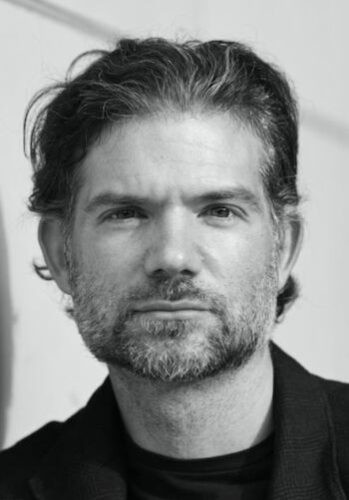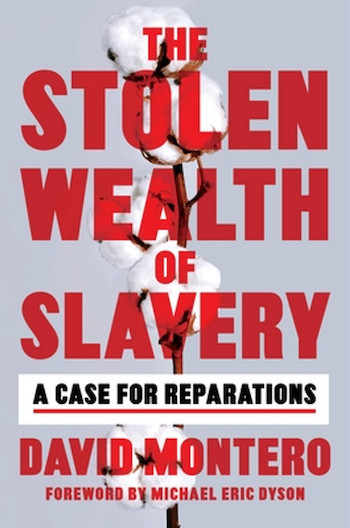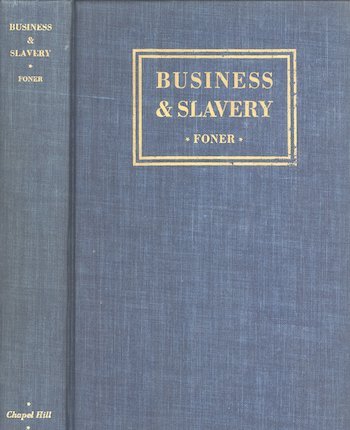Author Interview: Journalist David Montero on “The Stolen Wealth of Slavery”
By Blake Maddux
“A lot of books tend to talk about slavery as something that just happened in the South and ended in 1865. I felt like there could be a book about how the North was actually making more of the profit and was in some ways more responsible morally, politically, and financially than the South.”

Journalist David Montero. Photo: Sven Stork
David Montero is a two-time Emmy nominee for his work on Frontline, a winner of The South Asian Journalist Association’s Daniel Pearl Award for outstanding reporting about South Asia, and author of Kickback: Exposing the Global Corporate Bribery Network.
He recently moved to Arlington, Massachusetts, when his wife, Professor Mehr Latif, accepted a position in UMass Boston’s Department of Conflict Resolution, Human Security, and Global Governance.
On February 6, Legacy Lit — an imprint of Hachette Book Group — will publish Montero’s second book, The Stolen Wealth of Slavery: A Case for Reparations (forward by Michael Eric Dyson).
“In America, you did not have to enslave a Black person yourself to benefit immensely from the labor and the wealth that Black people created,” Montero told me in a recent phone interview. “The entire country did.”
Specifically, Montero means that the North profited enormously while the majority of southerners barely scraped by.
As he writes in the Introduction, “America’s system of enslaving Black people to produce world historical wealth was and is an East Coast story more than a southern one.… [E]ven enslavers of the highest social eminence, contrary to popular belief, were often just making ends meet, beset with crippling debt and mounting costs.”
Below is a Q&A based on the conversation that Montero and I had in advance of his appearance at Brookline Booksmith on February 7.
The Arts Fuse: How did you go from a book about global corporate bribery to The Stolen Wealth of Slavery?
David Montero: The common thread is the money and the diabolical afterlife that money goes on to lead. That’s what I traced in my first book. All these bribes that are paid around the world go on in insidious ways to disrupt democracy, empower autocrats, and fund terrorist groups. After money is paid, we tend to lose sight of the story and think the money disappears. That book taught me that the real story is how that money goes on to live a second and a third act.
Then one day my wife told me that she had read that Lloyd’s of London had admitted for the first time in its 300-year history that it had profited from slavery. I thought it was fascinating that they had an archive in which this was recorded and that they had just apparently been sitting on it. They only released that information after the summer of uprisings around the murder of George Floyd. It made me wonder which other banks and corporations had such records.
 AF: What made you realize that you had a book-length project on your hands?
AF: What made you realize that you had a book-length project on your hands?
DM: The more I looked, the more I found. There’s this narrative that slavery took place in the South, made some planters rich, the Civil War happened, the planters lost all their money, and the wealth of slavery disappeared. I asked myself, where did all this money go? The more I followed the money, the more I realized that it was going to people on Wall Street. It was going to bankers and people who owned ships. Those people were in Boston and New York. I realized that this story is only partially set in the South. It’s not really been talked about as much, the perspective of how the North and Wall Street was involved in enslavement and the finance and profiting from it.
AF: Whose research does The Stolen Wealth of Slavery build on?
DM: The main book would be Eric Williams’s Capitalism and Slavery. That is just an amazing book that is so dense. The amount of research that Williams put into that book is astounding. That book provided a blueprint of how you can start to document this stuff. But Williams focused on how enslavement enriched Great Britain. He wasn’t looking at the United States, although he does talk at length about a number of American families who were based in England. That book really showed that you could tell this huge story with incredible narrative sweep and be very granular about the detail, too.
AF: Which parts of the book are based on your original research?
DM: He focused more on the 17th and 18th centuries and somewhat on the 19th century in England. My book picks up in America from the early decades of the 19th century all the way up to the present day. In a way, what Williams was saying was very much an inspiration for me because it’s a very similar dynamic. He was talking about the commercial evolution of individuals and institutions that were enriched by the subjugated labor of Black people. After that system sort of fell apart in Great Britain, it was picked up in the United States on a much larger scale.
AF: At the risk of asking you to brag, is yours the most in-depth examination on the North’s complicity with slavery?
DM: Uh, yes. I don’t want to brag, but I guess, yes! There’s an amazing book by Philip S. Foner from 1941 called Business and Slavery. That book looked at the role that New York merchants played in supporting slavery, but he didn’t really go in depth. It was more about the politics of why the New York merchant community supported enslavement.
What my book does is talk more about the mechanics of how the money is made and the banks that were involved. I think it does more than has previously been done. And that’s why I wrote it. A lot of books tend to talk about slavery as something that just happened in the South and ended in 1865. I felt like there could be a book about how the North was actually making more of the profit and was in some ways more responsible morally, politically, and financially than the South.
AF: I think that most Americans imagine antebellum southerners as sipping lemonade while sitting in rocking chairs on their porches having been enriched by the labor of enslaved persons. Were huge southern plantations that created great wealth the exception?
DM: Yes, exactly. I don’t want to dispel entirely the notion that some southern enslavement families were fantastically rich. There were probably hundreds if not thousands of them. But we have to remember that there were tens if not hundreds of thousands of families that enslaved people, and in most cases they enslaved one person or five people. The top one percent — if we want to use that term — of enslaving families enslaved 50 or 100 Black people. It was even more rare to have enslaved 300 or 400 Black people. Slavery ran almost entirely on borrowing money, and most people were just constantly repaying that debt. Most enslaving families weren’t rich.
AF: Do you believe that the North has always had and continues to have a bit of a superiority complex due to its having abolished slavery long before the South?
DM: Yes, and I think this is a major problem and a major miss that warps the history of enslavement in America. The idea that the North somehow was not only not complicit but was the only force fighting against enslavement. I think we still labor under that misapprehension, that the South is to blame. That self-righteousness, I think, lives on and it is something about the narrative that needs to be changed.
 AF: Should this book help to erode that misapprehension?
AF: Should this book help to erode that misapprehension?
DM: I would love it if this book helps erode that, but it is probably here to stay. It’s so entrenched and obviously so comforting to so many. But yeah, I would hope that this book would help change that idea. Everybody was complicit in making money from this diabolical system.
AF: What other changes would come about if this book were to have all or at least some of the impact that you hope it will?
DM: A new narrative about enslavement that makes us understand that we all benefited as a nation from Black people’s labor. Even families that didn’t enslave Black people themselves. Even if you lived in the North. A new narrative about the cascading effects of the wealth and who benefited. And an understanding that this wealth didn’t die. I would like to think that this book could help people understand that this wealth still lives on primarily in the form of corporations and their institutional wealth, mainly banks [e.g., Citibank, Bank of New York, and Bank of America]. This is not a history that ended in 1865. It’s a history that lives up until the present day.
AF: Reasonable people can disagree over the necessity and/or practicality of reparations. What do you say to those who oppose them on either or both grounds?
DM: People have been saying for a long time that reparations are impractical or unnecessary. It is not as impractical as it seems. America has been paying reparations to damaged communities for decades, if not centuries. We did it for Japanese Americans. The United States really pushed the German government to reparations to descendants and survivors of the Holocaust. There’s a very clear track record of making reparative payments. It’s something that the United States has actually pioneered. It’s very American, in fact, to do that.
And to say it’s impractical, well, sending a man to the moon is impractical. Sending every person in America a check during Covid for relief seemed impractical. These are things that we can do, it’s just twisted into political knots because of a lack of political will. It’s true that no one alive today is responsible for slavery. But that doesn’t mean that the United States is innocent. We have an opportunity to repair that wound, and that is very American to me. That is a kind of patriotism, to want to make this country better through repairing the harm done to our fellow citizens. I don’t think that’s impractical at all.
Blake Maddux is a freelance journalist who regularly contributes to the Arts Fuse, Somerville Times, and Beverly Citizen. He has also written for DigBoston, the ARTery, Lynn Happens, the Providence Journal, The Onion’s A.V. Club, and the Columbus Dispatch. A native Ohioan, he moved to Boston in 2002 and currently lives with his wife and six-year-old twins — Elliot Samuel and Xander Jackson — in Salem, MA.
